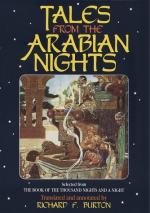[FN#164] The style of this letter is that of a public scribe in a Cairo market-place thirty years ago.
[FN#165] i.e.. she could not help falling in love with this beauty of a man.
[FN#166] “Kudrat,” used somewhat in the sense of our vague “Providence.” The sentence means, leave Omnipotence to manage him. Mr. Redhouse, who forces a likeness between Moslem and Christian theology, tells us that “Qader is unjustly translated by Fate and Destiny, an old pagan idea abhorrent to Al-Islam which reposes on God’s providence.” He makes Kaza and Kismet quasi-synonymes of “Qaza” and “Qader,” the former signifying God’s decree, the latter our allotted portion, and he would render both by dispensation. Of course it is convenient to forget the Guarded Tablet of the learned and the Night of Power and skull-lectures of the vulgar. The eminent Turkish scholar would also translate Salat by worship (du’a being prayer) because it signifies a simple act of adoration without entreaty. If he will read the Opener of the Koran, recited in every set of prayers, he will find an especial request to be “led to the path which is straight.” These vagaries are seriously adopted by Mr. E. J. W. Gibb in his Ottoman Poems (p. 245, etc.) London: Trubner and Co., 1882; and they deserve, I think, reprehension, because they serve only to mislead; and the high authority of the source whence they come necessarily recommends them to many.
[FN#167] The reader will have noticed the likeness of this tale to that of Ibn Mansur and the Lady Budur (vol. iv., 228 et seq.){Vol 4, Tale 42} For this reason Lane leaves it untranslated (iii. 252).
[FN#168] Lane also omits this tale (iii. 252). See Night dclxxxviii., vol. vii. p. 113 et seq., for a variant of the story.
[FN#169] Third Abbaside, A.H. 158-169 (=775-785), and father of Harun Al-Rashid. He is known chiefly for his eccentricities, such as cutting the throats of all his carrier-pigeons, making a man dine off marrow and sugar and having snow sent to him at Meccah, a distance of 700 miles.
[FN#170] Arab. “Mirt”; the dictionaries give a short shift, cloak or breeches of wool or coarse silk.
[FN#171] Arab. “Mayazib” plur. of the Pers. Mizab (orig. Miz-i-ab=channel of water) a spout for roof-rain. That which drains the Ka’abah on the N.-W. side is called Mizab al-Rahmah (Gargoyle of Mercy) and pilgrims stand under it for a douche of holy water. It is supposed to be of gold, but really of silver gold-plated and is described of Burckhardt and myself. (Pilgrimage iii. 164.) The length is 4 feet 10 in.; width 9 in.; height of sides 8 in.; and slope at mouth 1 foot 6 in long.
[FN#172] The Mac. and Bull Edits. have by mistake “Son of Ishak.” Lane has “Is-hale the Son of Ibrahim” following Trebutien (iii. 483) but suggests in a note the right reading as above.
[FN#173] Again masculine for feminine.
[FN#174] There are two of this name. The Upper al-Akik contains the whole site of Al-Medinah; the Lower is on the Meccan road about four miles S.W. of the city. The Prophet called it “blessed” because ordered by an angel to pray therein. The poets have said pretty things about it, e.g.




